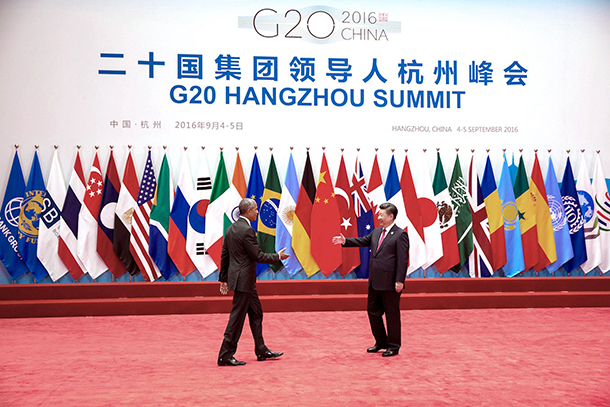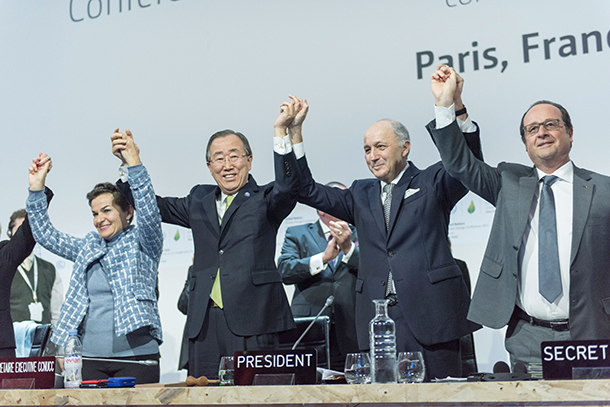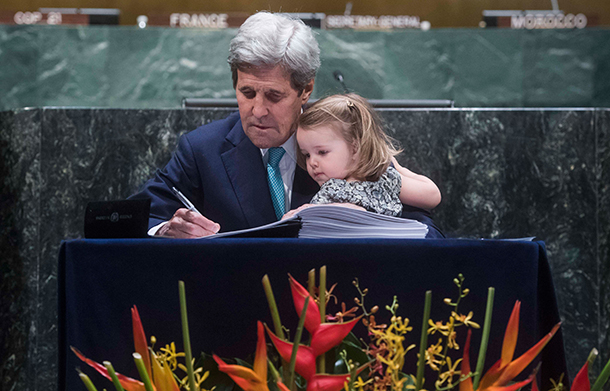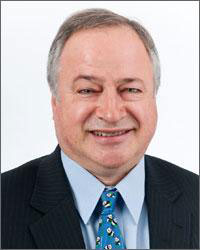U.S. And China Ratify Paris Agreement
Air Date: Week of September 9, 2016

President Obama and Chinese President Xi Jinping greet each other at the G20 Summit in Hangzhou, September 2016. (Photo: Pete Souza / Official White House Photo)
The two nations with the most global warming emissions have now ratified the landmark Paris Agreement, with other countries expected to follow. Alden Meyer of the Union of Concerned Scientists and host Steve Curwood discuss how more nations representing at least 10 percent of emissions need to ratify to bring the accord into force, and how the 2016 US presidential election could impact this landmark climate pact.
Transcript
CURWOOD: From the Jennifer and Ted Stanley studios at the University of Massachusetts Boston and PRI, this is Living on Earth. I’m Steve Curwood. US President Obama and Chinese President Xi have formally ratified the Paris climate Agreement. This landmark moment in international relations took place as heads of state were gathering at the recent G20 meeting in China. Climate diplomacy expert Alden Meyer of the Union of Concerned Scientists is here to put the ratification in context. Alden, welcome back to Living on Earth.
MEYER: Good to be with you again, Steve.
CURWOOD: So, how big a deal is this? How significant is it that China and the United States, the countries with the two largest economies in the world have now ratified the Paris Agreement?
MEYER: It's a very big deal because, to take effect, Paris needs to be ratified by 55 countries representing 55 percent of global emissions. US and China bring us up to 26 countries having taken an action to join Paris. Most of the rest are small islands and vulnerable countries. But importantly they bring us up nearly to 40 percent of global emissions. There's a number of them that are either taking action or signaling they will take action by the end of this year. Brazil, Argentina, Chile, Canada, Australia, Ukraine, and the latest estimate is that we'll have somewhere between 55 and 60 countries representing almost 60 percent of global missions to push us over that finish line and have Paris taking effect.
CURWOOD: And, of course, the end of the year is important to us in terms of American politics. Donald Trump has vowed to abandon the Paris Agreement if he wins the White House in November. If this has been all agreed to do before he takes office, to what extent could he derail this process?
MEYER: Well, if the agreement has entered into force before as it's likely to, it would be four years before the US could formally withdraw under the terms of agreement. That's not the big question. The big question is would Donald Trump take any action to live up to the US commitments under Paris, and the answer from his statement seems to be no, that he would not push to decarbonize the US economy, to shift away from coal and other fossil fuels and the renewables and all the other steps that President Obama has been taking. So, I think that is what is raising real concern among other leaders and organizations around the world. It's not whether he would formally withdraw the US from the agreement, it's whether he would lift a finger to live up to our commitments under it.

The leaders of the Paris Agreement celebrate its adoption at COP21 in December 2015. From left: Executive Secretary of the UN Framework Convention on Climate Change (UNFCCC) Christiana Figueres; Secretary-General Ban Ki-moon; President of COP21 Laurent Fabius; and French President François Hollande. (Photo: CC BY-NC-ND 2.0)
CURWOOD: Of course, right now, the President of the United States is Barack Obama. Why did President Obama and the Chinese President Xi choose this moment to ratify?
MEYER: Well, I think they wanted to continue the leadership that their two countries have been showing over the last several years. It was really in the fall of 2014 that the first US-China agreement brokered a real breakthrough here and I think laid the groundwork for the Paris Agreement itself because, of course, you remember back in Copenhagen the two countries were at loggerheads and really pointing fingers at each other and the rhetoric was getting quite intense. So the fact that the US and China have in working together on implementation of Paris and choosing this moment right before the G20 summit of world leaders in Hangzhou, China, I think was very significant. And of course both of them are encouraging other leaders in other countries to join them in implementing Paris.
CURWOOD: Some folks ask how President Obama's been able to single-handedly ratify the Paris Agreement without having to go to the US Senate.
MEYER: Well, under our US law and tradition all the way back to George Washington, there are a number of actions that the president has taken on international agreements over the years, and it's clear that with the Senate having ratified the underlying treaty, the Rio treaty back from 1992, under George H. W. Bush, that the president has authority to adopt this agreement in Paris which is basically implementing that treaty that was ratified by the Senate. And of course he is acting under existing authority, the Clean Air Act and other laws that the Congress has passed, and the Supreme Court has upheld, to move forward on implementation, domestic actions needed to meet the commitments that he made in Paris, the 26 to 28 percent emissions reduction below 2005 levels by 2025. So, on both the international side and the domestic side, the administration is claiming it has the authority under previous congressional action to join the Paris Agreement.

U.S. Secretary of State John Kerry signed the Paris Agreement at the United Nations headquarters in New York on April 22nd, 2016, his granddaughter in tow. (Photo: Amanda Voisard / United Nations, CC BY-NC-ND 2.0)
CURWOOD: Some Republicans are saying “No.” What's their best argument?
MEYER: Well, I mean I think on one hand they say the President doesn't have authority to do this and on the other hand they say, “Well other countries aren't joining us and it's not going to be significant anyway,” and I think one of the political impacts of US China agreement is to undercut that argument that we're on our own here and others won't join us.
CURWOOD: So, the United States in Paris said, look we have the Clean Power Plan that we’re going to move forward with. That now seems to be in jeopardy. So where are we now then in terms of meeting our obligations under the Paris agreement, do you think?
MEYER: Well, I mean, the Clean Power Plant, of course, there was a stay put on it by the Supreme Court in a 5-4 decision that was not a ruling on the merits. The Clean Power Plan will be up before the appeals court here in DC, the Circuit Court later this month. It's expected to survive that challenge and likely will go to the Supreme Court next year, and of course there it partly depends on the outcome of the election and who takes the seat vacated by the death of Antonin Scalia. Most states seem to be going forward with preparing to implement their obligations under the Clean Power Plan, so that shows you I think where their betting is. It's a pretty good news story if you look back over the last eight years domestically on what the President's been able to achieve.
CURWOOD: Alden, before you go, give me the big picture here how on track are the world's nations in terms of tackling climate disruption at this point?

Alden Meyer is director of strategy and policy for the Union of Concerned Scientists and the director of its Washington, D.C. office. (Photo: Union of Concerned Scientists)
MEYER: Well, I mean there's good news and bad news. The good news is that there is unprecedented investment in clean energy and renewable energy and energy efficiency, and the costs of those technologies are coming down, and it looks like we may have reached a global peak in emissions and starting to bend the curve downward. The bad news of course is that there's still a fair amount of investment in conventional fossil fuels, coal plants and other technologies and of course, the real question is, will we decarbonize the global economy quickly enough to stay out ahead of the physical impacts of climate change, and of course there the jury is out. We really are in a race with the physical climate system, and of course we're seeing mounting impacts of climate change by the week.
CURWOOD: Alden Meyer is Director of Strategy and Policy for the Union of Concerned Scientists. Thanks so much for taking the time with me, Alden.
MEYER: Good to be with you, Steve.
Links
Paris Agreement -- Status of Ratification
Reuters: “U.S., China ratify Paris climate agreement”
Hindustan Times: “India could get more time to ratify Paris climate agreement”
Listen to LOE’s previous coverage of the Clean Power Plan stay
Living on Earth wants to hear from you!
Living on Earth
62 Calef Highway, Suite 212
Lee, NH 03861
Telephone: 617-287-4121
E-mail: comments@loe.org
Newsletter [Click here]
Donate to Living on Earth!
Living on Earth is an independent media program and relies entirely on contributions from listeners and institutions supporting public service. Please donate now to preserve an independent environmental voice.
NewsletterLiving on Earth offers a weekly delivery of the show's rundown to your mailbox. Sign up for our newsletter today!
 Sailors For The Sea: Be the change you want to sea.
Sailors For The Sea: Be the change you want to sea.
 The Grantham Foundation for the Protection of the Environment: Committed to protecting and improving the health of the global environment.
The Grantham Foundation for the Protection of the Environment: Committed to protecting and improving the health of the global environment.
 Contribute to Living on Earth and receive, as our gift to you, an archival print of one of Mark Seth Lender's extraordinary wildlife photographs. Follow the link to see Mark's current collection of photographs.
Contribute to Living on Earth and receive, as our gift to you, an archival print of one of Mark Seth Lender's extraordinary wildlife photographs. Follow the link to see Mark's current collection of photographs.
 Buy a signed copy of Mark Seth Lender's book Smeagull the Seagull & support Living on Earth
Buy a signed copy of Mark Seth Lender's book Smeagull the Seagull & support Living on Earth

